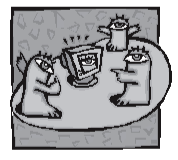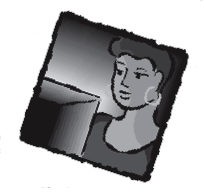 |
| About Alan |
| Tutorials |
| Free files |
| Win9x FAQs |
|
|
| |
| Articles |
| BIV articles |
| Archive |
| Other articles |
| Archive |
| |
 |
|
|
|
Teachers Make the
Difference
by Alan Zisman (c) 2003 First published in VESTA News October 2003 Technotes column What is it that makes a real difference in using technology in schools? Teachers make the difference when it comes to computers. Back in the early
1980s, the idea was that everyone would have to learn computer
programming. So some schools
taught students the BASIC programming language. Others, LOGO. Or maybe
PASCAL was
the secret to success. Now, programming has fallen from fashion. It’s
is a
useful skill, but it’s now mostly taught to those wanting a career
using it. And
few would-be software developers learn either BASIC, LOGO, or PASCAL.
More recently, we’ve
survived fashions for brand-name software packages. If your school
bought Brand
X, you got everything you needed. Not only a complete curriculum, it
was so easy
to use that even an adult could use it! Or maybe the
secret was how your computers were connected or where they were
located. Schools
with networks were ‘high tech’ claimed the 1998 corporate-sponsored
‘Star
Report’. Or maybe the answer was a computer lab. Or a few computers in
each
classroom. Or pods in the library. With each
successive technology fad, too many schools spent thousands of
hard-to-get
education dollars on hardware, software, and networks but ended up with
expensive systems that either rarely got turned on or were used more as
game
systems than learning tools. Not surprisingly,
many teachers, parents, and administrators have become cynical about
the role
of technology in education. Computers in schools can all too often seem
like
the new-age equivalent of that old joke that asks ‘What’s a boat?’,
with the
answer ‘A hole in the ocean that you pour money into’. OK, so what makes
a real difference in using technology in schools? Teachers.
It takes some
work, some thought, and some planning. That shouldn’t be a
surprise—good
educational practice involving computers or the Internet isn’t any
different
than anything else we do in the classroom. An effective lesson
involving
technology isn’t all that different from any other effective lesson.
There need
to be clear goals and clear ways to evaluate student learning. Computers and the
Internet can be tools to help with literacy and writing, with
understanding science
and math concepts. They can be used for research and for learning to
critically
evaluate information. They can be used to create visual art,
animations, and
music. But in all cases, they are just one more tool to help students
learn.
And as with any tool for learning, they work best when there’s a clear
plan.
Similarly,
searching the Web is different from using a school library’s catalogue.
But
reading for understanding, organizing information, and transforming
facts and
data into knowledge are the same whether pages are on screen or in
print.
|
|
|
|
|
| Alan Zisman is a Vancouver educator, writer, and computer specialist. He can be reached at E-mail Alan |

 Then
there were
hardware wars. Schools bought Commodore PETs or C-64s or Amigas. Or
they went
Apple: Apple IIs or Macs. Still others opted for IBM-style PCs, first
with DOS,
later with Windows.
Then
there were
hardware wars. Schools bought Commodore PETs or C-64s or Amigas. Or
they went
Apple: Apple IIs or Macs. Still others opted for IBM-style PCs, first
with DOS,
later with Windows. A computer without
a teacher is a game system. A computer with a teacher is a tool for
extending
the curriculum.
A computer without
a teacher is a game system. A computer with a teacher is a tool for
extending
the curriculum.  As
teachers get
comfortable using these new tools, they are often surprised how much
they
already know; as with any tool, there are techniques to learn, but the
basics
remain the same. Saving files on a hard disk is a different technique
than
organizing files in folders in a filing cabinet but ideas of organizing
are the
same.
As
teachers get
comfortable using these new tools, they are often surprised how much
they
already know; as with any tool, there are techniques to learn, but the
basics
remain the same. Saving files on a hard disk is a different technique
than
organizing files in folders in a filing cabinet but ideas of organizing
are the
same.